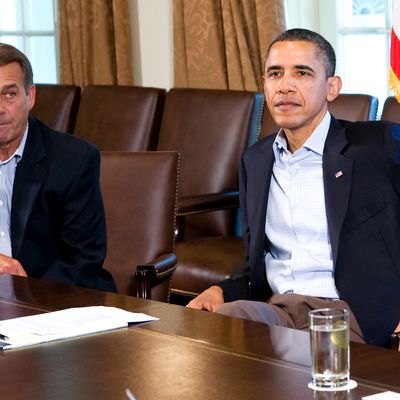
Last summer, President Obama desperately attempted to forge a long-term deficit reduction deal with Congressional Republicans. The notion that he could get the House GOP to accept any remotely balanced agreement was preposterous and doomed from the start, but Obama responded to the increasingly obvious reality by reducing his demands of the Republicans to virtually nothing.
The Washington Post has a long narrative report about the negotiations between Obama and the House Republicans. The narrative frame of the Post’s account is that Obama blew the potential deal at the last minute. That’s a story that people close to Obama’s fired chief of staff, Bill Daley, have been peddling for a long time. But that conclusion is utterly belied by the facts in the Post’s own account. But let’s put that aside for now, because the facts in the Post’s account support a different and far more disturbing conclusion: Obama was even more desperate to cut a deal than previously believed — dangerously desperate, in fact.
It has previously been reported that Obama had offered to John Boehner to make a series of cuts to Medicare, Social Security, and the domestic budget, to reduce top-end tax rates, and to prevent the expiration of the Bush tax cuts, in return for increasing tax revenue (over current tax levels) by about $800 billion over ten years. That is a pitiful sum of new revenue, less than half as much as recommended by deficit proposals by Bowles-Simpson, the Bipartisan Policy Center, and other bipartisan worthies. The blockbuster fact in the Post’s report, which the story does not in any way grapple with, is that even the $800 billion in tax revenue offered by Boehner was not, in fact, $800 billion in tax revenue:
In Boehner’s offer Friday night, the taxes came with strings attached. The Republicans wanted Obama to give up plans to raise the tax rate paid by the wealthiest Americans, now set at 35 percent. Instead, they wanted that rate to go down. They also wanted to preserve low rates for investment income — one of the biggest perks for the wealthy in the tax code — and establish a blanket exemption from U.S. taxes for corporate profits earned overseas.
Another key caveat: Much of the $800 billion would have to come from overhauling the tax code — not from higher tax rates. The Republicans believed lower rates and a simpler code would generate new revenue by discouraging cheating and spurring economic growth. If the White House would agree to count that money, the Republican leaders said, then they might have a deal.
Okay, so the Republicans were demanding big tax cuts for the rich — lower income tax rates, and keeping in place the tax breaks that most benefit the rich, thereby insuring that the burden of any higher revenue would fall on the non-rich. Obama, incredibly, agreed to that — he agreed to a debt reduction plan that would exempt the wealthy from any sacrifice, and indeed protect them from the possibility that their tax rates would rise when the Bush tax cuts expire.
The incredible thing is that even this offer was not enough. Republicans also demanded that the $800 billion in higher revenue largely come from assuming that lower tax rates would cause the economy to grow. This is a theoretically possible outcome, but a highly dubious assumption in practice (witness the rapid growth that followed Bill Clinton’s tax hike on the rich, and the slow growth that followed George W. Bush tax cuts for the rich.) The Republican position was that its higher revenue, in other words, had to be imaginary, theoretical revenue.
Now, the story suggests that Obama did not agree to this demand. But he didn’t reject it out of hand, either. Instead, Obama was so desperate for a deal that he decided to proceed as if this all could be ironed out — that $800 billion in mostly imaginary revenue was really pretty much the same thing as $800 billion in real revenue. Bill Daley is quoted in the story saying, “We walked away feeling that we were 80 percent there. But no doubt about it, like any negotiation, the final 20 percent is always the most difficult.” But the difference between imaginary revenue and real revenue isn’t 20 percent of the question, it’s the entire question. The central fiscal issue in American politics is the Republican Party’s insistence on cutting taxes for the rich everywhere and always with no compromise possible. The Post’s story suggests that there was zero progress on this impediment, and Obama wanted a deal so badly he wanted to proceed as if this could be ironed out in the details.
Note, of course, that the Republicans, in this account, didn’t even agree to the spending cuts plus $800 billion in largely imaginary revenue while protecting the rich. The story reports that the Republicans said they “might have a deal.” Might!
Now, let’s return to the Post’s version, which is likely to be the official Washington narrative of the negotiations. The Post places great emphasis on the fact that, in the middle of trying to get Republicans to a fantastically generous deal, a bipartisan group of Senators announced their own deal. This one included $2 trillion in higher revenue — in real money, not the imaginary dollars with little pictures of Ronald Reagan ascending to heaven atop the Laffer Curve on them offered up by House Republicans.
At this point it occurred to Obama that he might have a wee problem with his base. “We’d be beat up miserably by Democrats who thought we got out-negotiated,” recalls Daley. (Ya think?) So Obama briefly backtracked, and asked Boehner if he would give him a little more revenue — $1.2 trillion, still far less than all the other bipartisan deals — in return for deeper cuts to Medicare. Boehner refused to respond. Obama responded to the silence by calling back and offering to take Boehner’s previous offer. Boehner replied, “We don’t have time to reopen these negotiations.”
The Post’s story explains that Obama’s final capitulation failed because “by then it was too late.” But why was it too late? Because Boehner said it was too late. It didn’t have to be too late. If the House Republicans wanted to pass that deal, they could have passed it. But the clear reality is that Boehner lacked the votes for even the largely-imaginary $800 billion in revenue.
The Post also, hilariously, extensively quotes Republicans castigating Obama for having praised the Senate Gang of Six deal. “His appearance that day,” reports the Post, “caused more problems by increasing suspicions among conservatives about the group’s framework — and boosting their distrust of any bipartisan dealmaking.” How? Well, conservatives really hated the Gang of Six deal, and while they might have been persuaded to accept the $800 billion — really, the “$800 billion” — Obama’s praising of a different deal forced them to turn against the Obama-Boehner agreement, too.
Obviously this makes no sense whatsoever. If Republicans wanted to approve the deal negotiated between Obama and Boehner, they would have. Obama having kind words for a different proposal is neither here nor there. It’s also worth noting that Republicans and various nonpartisan deficit scolds have been attacking Obama for having failed to explicitly endorse the Bowles-Simpson plan from 2010. Obama thought, shrewdly, that his explicit embrace would make it impossible for Republicans to support the plan, just as Obama’s embrace of several previous Republican-endorsed environmental and health care plans had caused the party to turn against them.
But, faced with unrelenting criticism for his decision to not fully endorse Bowles-Simpson, when the next bipartisan plan came out, this time Obama chose to praise it to the skies. And the criticism is that he killed a bipartisan deal by doing so!
The obvious reality is that there never has been any way to get House Republicans to agree to a balanced deficit deal. Even the capitulation Obama offered — $800 billion in semi-imaginary revenue, all raised from the non-rich — was too much for them to agree to. Locking in that low level of revenue would have required huge cuts in spending, making a decent liberal vision of government impossible. The Post is making the case that there was a potential deal, and Obama blew it by failing to properly handle the easily-spooked Republican caucus. What the story actually shows is that Obama’s disastrous weakness in the summer of 2011 went further toward undermining liberalism than anybody previously knew.






























